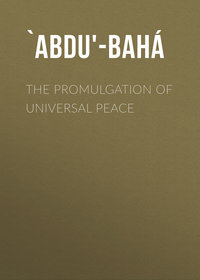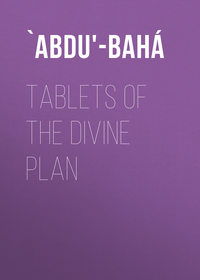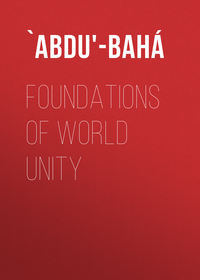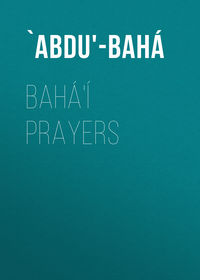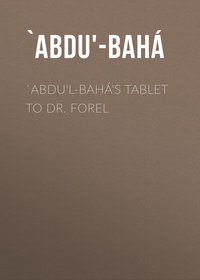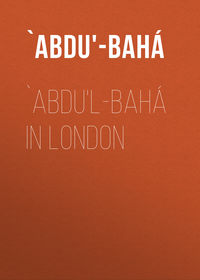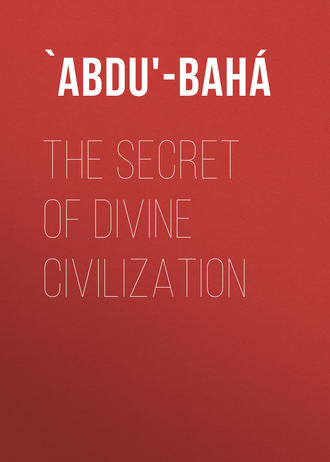 полная версия
полная версияThe Secret of Divine Civilization
Up to now the religious law has not been given a decisive role in our courts, because each of the ‘ulamá has been handing down decrees as he saw fit, based on his arbitrary interpretation and personal opinion. For example, two men will go to law, and one of the ‘ulamá will find for the plaintiff and another for the defendant. It may even happen that in one and the same case two conflicting decisions will be handed down by the same mujtahid, on the grounds that he was inspired first in one direction and then in the other. There can be no doubt that this state of affairs has confused every important issue and must jeopardize the very foundations of society. For neither the plaintiff nor the defendant ever loses hope of eventual success, and each in turn will waste his life in the attempt to secure a later verdict which would reverse the previous one. Their entire time is thus given over to litigation, with the result that their life instead of being devoted to beneficial undertakings and necessary personal affairs, is completely involved with the dispute. Indeed, these two litigants might just as well be dead, for they can serve their government and community not a particle. If, however, a definite and final verdict were forthcoming, the duly convicted party would perforce give up all hope of reopening the case, and would then be relieved on that score and would go back to looking after his own concerns and those of others.
Since the primary means for securing the peace and tranquillity of the people, and the most effective agency for the advancement of high and low alike, is this all-important matter, it is incumbent on those learned members of the great consultative assembly who are thoroughly versed in the Divine law to evolve a single, direct and definite procedure for the settlement of litigations. This instrument should then be published throughout the country by order of the king, and its provisions should be strictly adhered to. This all-important question requires the most urgent attention.
The second attribute of perfection is justice and impartiality. This means to have no regard for one’s own personal benefits and selfish advantages, and to carry out the laws of God without the slightest concern for anything else. It means to see one’s self as only one of the servants of God, the All-Possessing, and except for aspiring to spiritual distinction, never attempting to be singled out from the others. It means to consider the welfare of the community as one’s own. It means, in brief, to regard humanity as a single individual, and one’s own self as a member of that corporeal form, and to know of a certainty that if pain or injury afflicts any member of that body, it must inevitably result in suffering for all the rest.
The third requirement of perfection is to arise with complete sincerity and purity of purpose to educate the masses: to exert the utmost effort to instruct them in the various branches of learning and useful sciences, to encourage the development of modern progress, to widen the scope of commerce, industry and the arts, to further such measures as will increase the people’s wealth. For the mass of the population is uninformed as to these vital agencies which would constitute an immediate remedy for society’s chronic ills.
It is essential that scholars and the spiritually learned should undertake in all sincerity and purity of intent and for the sake of God alone, to counsel and exhort the masses and clarify their vision with that collyrium which is knowledge. For today the people out of the depths of their superstition, imagine that any individual who believes in God and His signs, and in the Prophets and Divine Revelations and laws, and is a devout and God-fearing person, must of necessity remain idle and spend his days in sloth, so as to be considered in the sight of God as one who has forsaken the world and its vanities, set his heart on the life to come, and isolated himself from human beings in order to draw nearer to God. Since this theme will be developed elsewhere in the present text, We shall leave it for the moment.
Other attributes of perfection are to fear God, to love God by loving His servants, to exercise mildness and forbearance and calm, to be sincere, amenable, clement and compassionate; to have resolution and courage, trustworthiness and energy, to strive and struggle, to be generous, loyal, without malice, to have zeal and a sense of honor, to be high-minded and magnanimous, and to have regard for the rights of others. Whoever is lacking in these excellent human qualities is defective. If We were to explain the inner meanings of each one of these attributes, “the poem would take up seventy maunds25 of paper.”
[Pages 41–60]
The second of these spiritual standards which apply to the possessor of knowledge is that he should be the defender of his faith. It is obvious that these holy words do not refer exclusively to searching out the implications of the Law, observing the forms of worship, avoiding greater and lesser sins, practicing the religious ordinances, and by all these methods, protecting the Faith. They mean rather that the whole population should be protected in every way; that every effort should be exerted to adopt a combination of all possible measures to raise up the Word of God, increase the number of believers, promote the Faith of God and exalt it and make it victorious over other religions.
If, indeed, the Muslim religious authorities had persevered along these lines as they ought to have done, by now every nation on earth would have been gathered into the shelter of the unity of God and the bright fire of “that He may make it victorious over every other religion”26 would have flamed out like the sun in the midmost heart of the world.
Fifteen centuries after Christ, Luther, who was originally one of the twelve members of a Catholic religious body at the center of the Papal government and later on initiated the Protestant religious belief, opposed the Pope on certain points of doctrine such as the prohibition of monastic marriage, the revering and bowing down before images of the Apostles and Christian leaders of the past, and various other religious practices and ceremonies which were accretional to the ordinances of the Gospel. Although at that period the power of the Pope was so great and he was regarded with such awe that the kings of Europe shook and trembled before him, and he held control of all Europe’s major concerns in the grasp of his might—nevertheless because Luther’s position as regards the freedom of religious leaders to marry, the abstention from worshiping and making prostrations before images and representations hung in the churches, and the abrogation of ceremonials which had been added on to the Gospel, was demonstrably correct, and because the proper means were adopted for the promulgation of his views: within these last four hundred and some years the majority of the population of America, four-fifths of Germany and England and a large percentage of Austrians, in sum about one hundred and twenty-five million people drawn from other Christian denominations, have entered the Protestant Church. The leaders of this religion are still making every effort to promote it, and today on the East Coast of Africa, ostensibly to emancipate the Sudanese and various Negro peoples, they have established schools and colleges and are training and civilizing completely savage African tribes, while their true and primary purpose is to convert some of the Muslim Negro tribes to Protestantism. Every community is toiling for the advancement of its people, and we (i.e., Muslims) sleep on!
Although it was not clear what purpose impelled this man or where he was tending, see how the zealous efforts of Protestant leaders have spread his doctrines far and wide.
Now if the illustrious people of the one true God, the recipients of His confirmations, the objects of His Divine assistance, should put forth all their strength, and with complete dedication, relying upon God and turning aside from all else but Him, should adopt procedures for spreading the Faith and should bend all their efforts to this end, it is certain that His Divine light would envelop the whole earth.
A few, who are unaware of the reality below the surface of events, who cannot feel the pulse of the world under their fingers, who do not know what a massive dose of truth must be administered to heal this chronic old disease of falsehood, believe that the Faith can only be spread by the sword, and bolster their opinion with the Tradition, “I am a Prophet by the sword.” If, however, they would carefully examine this question, they would see that in this day and age the sword is not a suitable means for promulgating the Faith, for it would only fill peoples’ hearts with revulsion and terror. According to the Divine Law of Muḥammad, it is not permissible to compel the People of the Book to acknowledge and accept the Faith. While it is a sacred obligation devolving on every conscientious believer in the unity of God to guide mankind to the truth, the Traditions “I am a Prophet by the sword” and “I am commanded to threaten the lives of the people until they say, ‘There is none other God but God’” referred to the idolaters of the Days of Ignorance, who in their blindness and bestiality had sunk below the level of human beings. A faith born of sword thrusts could hardly be relied upon, and would for any trifling cause revert to error and unbelief. After the ascension of Muḥammad, and His passing to “the seat of truth, in the presence of the potent King,”27 the tribes around Medina apostatized from their Faith, turning back to the idolatry of pagan times.
Remember when the holy breaths of the Spirit of God (Jesus) were shedding their sweetness over Palestine and Galilee, over the shores of Jordan and the regions around Jerusalem, and the wondrous melodies of the Gospel were sounding in the ears of the spiritually illumined, all the peoples of Asia and Europe, of Africa and America, of Oceania, which comprises the islands and archipelagoes of the Pacific and Indian Oceans, were fire-worshipers and pagans, ignorant of the Divine Voice that spoke out on the Day of the Covenant.28 Alone the Jews believed in the divinity and oneness of God. Following the declaration of Jesus, the pure and reviving breath of His mouth conferred eternal life on the inhabitants of those regions for a period of three years, and through Divine Revelation the Law of Christ, at that time the vital remedy for the ailing body of the world, was established. In the days of Jesus only a few individuals turned their faces toward God; in fact only the twelve disciples and a few women truly became believers, and one of the disciples, Judas Iscariot apostatized from his Faith, leaving eleven. After the ascension of Jesus to the Realm of Glory, these few souls stood up with their spiritual qualities and with deeds that were pure and holy, and they arose by the power of God and the life-giving breaths of the Messiah to save all the peoples of the earth. Then all the idolatrous nations as well as the Jews rose up in their might to kill the Divine fire that had been lit in the lamp of Jerusalem. “Fain would they put out God’s light with their mouths: but God hath willed to perfect His light, albeit the infidels abhor it.”29 Under the fiercest tortures, they did every one of these holy souls to death; with butchers’ cleavers, they chopped the pure and undefiled bodies of some of them to pieces and burned them in furnaces, and they stretched some of the followers on the rack and then buried them alive. In spite of this agonizing requital, the Christians continued to teach the Cause of God, and they never drew a sword from its scabbard or even so much as grazed a cheek. Then in the end the Faith of Christ encompassed the whole earth, so that in Europe and America no traces of other religions were left, and today in Asia and Africa and Oceania, large masses of people are living within the sanctuary of the Four Gospels.
It has now by the above irrefutable proofs been fully established that the Faith of God must be propagated through human perfections, through qualities that are excellent and pleasing, and spiritual behavior. If a soul of his own accord advances toward God he will be accepted at the Threshold of Oneness, for such a one is free of personal considerations, of greed and selfish interests, and he has taken refuge within the sheltering protection of his Lord. He will become known among men as trustworthy and truthful, temperate and scrupulous, high-minded and loyal, incorruptible and God-fearing. In this way the primary purpose in revealing the Divine Law—which is to bring about happiness in the after life and civilization and the refinement of character in this—will be realized. As for the sword, it will only produce a man who is outwardly a believer, and inwardly a traitor and apostate.
We shall here relate a story that will serve as an example to all. The Arabian chronicles tell how, at a time prior to the advent of Muḥammad, Nu’mán son of Mundhír the Lakhmite —an Arab king in the Days of Ignorance, whose seat of government was the city of Hírih—had one day returned so often to his wine-cup that his mind clouded over and his reason deserted him. In this drunken and insensible condition he gave orders that his two boon companions, his close and much-loved friends, Khálid son of Mudallil and ‘Amr son of Mas’úd-Kaldih, should be put to death. When he wakened after his carousal, he inquired for the two friends and was given the grievous news. He was sick at heart, and because of his intense love and longing for them, he built two splendid monuments over their two graves and he named these the Smeared-With-Blood.
Then he set apart two days out of the year, in memory of the two companions, and he called one of them the Day of Evil and one the Day of Grace. Every year on these two appointed days he would issue forth with pomp and circumstance and sit between the monuments. If, on the Day of Evil, his eye fell on any soul, that person would be put to death; but on the Day of Grace, whoever passed would be overwhelmed with gifts and benefits. Such was his rule, sealed with a mighty oath and always rigidly observed.
One day the king mounted his horse, that was called Maḥmúd, and rode out into the plains to hunt. Suddenly in the distance he caught sight of a wild donkey. Nu’mán urged on his horse to overtake it, and galloped away at such speed that he was cut off from his retinue. As night approached, the king was hopelessly lost. Then he made out a tent, far off in the desert, and he turned his horse and headed toward it. When he reached the entrance of the tent he asked, “Will you receive a guest?” The owner (who was Hanzalá, son of Ábi-Ghafráy-i-Tá’í) replied, “Yea.” He came forward and helped Nu’mán to dismount. Then he went to his wife and told her, “There are clear signs of greatness in the bearing of this person. Do your best to show him hospitality, and make ready a feast.” His wife said, “We have a ewe. Sacrifice it. And I have saved a little flour against such a day.” Hanzalá first milked the ewe and carried a bowl of milk to Nu’mán, and then he slaughtered her and prepared a meal; and what with his friendliness and loving-kindness, Nu’mán spent that night in peace and comfort. When dawn came, Nu’mán made ready to leave, and he said to Hanzalá: “You have shown me the utmost generosity, receiving and feasting me. I am Nu’mán, son of Mundhír, and I shall eagerly await your arrival at my court.”
Time passed, and famine fell on the land of Tayy. Hanzalá was in dire need and for this reason he sought out the king. By a strange coincidence he arrived on the Day of Evil. Nu’mán was greatly troubled in spirit. He began to reproach his friend, saying, “Why did you come to your friend on this day of all days? For this is the Day of Evil, that is, the Day of Wrath and the Day of Distress. This day, should my eyes alight on Qábús, my only son, he should not escape with his life. Now ask me whatever favor you will.”
Hanzalá said: “I knew nothing of your Day of Evil. As for the gifts of this life, they are meant for the living, and since I at this hour must drink of death, what can all the world’s storehouses avail me now?”
Nu’mán said, “There is no help for this.”
Hanzalá told him: “Respite me, then, that I may go back to my wife and make my testament. Next year I shall return, on the Day of Evil.”
Nu’mán then asked for a guarantor, so that, if Hanzalá should break his word, this guarantor would be put to death instead. Hanzalá, helpless and bewildered, looked about him. Then his gaze fell on one of Nu’mán’s retinue, Sharík, son of ‘Amr, son of Qays of Shaybán, and to him he recited these lines: “O my partner, O son of ‘Amr! Is there any escape from death? O brother of every afflicted one! O brother of him who is brotherless! O brother of Nu’mán, in thee today is a surety for the Shaykh. Where is Shaybán the noble—may the All-Merciful favor him!” But Sharík only answered, “O my brother, a man cannot gamble with his life.” At this the victim could not tell where to turn. Then a man named Qarád, son of Adjá the Kalbite stood up and offered himself as a surety, agreeing that, should he fail on the next Day of Wrath to deliver up the victim, the king might do with him, Qarád, as he wished. Nu’mán then bestowed five hundred camels on Hanzalá, and sent him home.
In the following year on the Day of Evil, as soon as the true dawn broke in the sky, Nu’mán as was his custom set out with pomp and pageantry and made for the two mausoleums called the Smeared-With-Blood. He brought Qarád along, to wreak his kingly wrath upon him. The pillars of the state then loosed their tongues and begged for mercy, imploring the king to respite Qarád until sundown, for they hoped that Hanzalá might yet return; but the king’s purpose was to spare the life of Hanzalá, and to requite his hospitality by putting Qarád to death in his place. As the sun began to set, they stripped off the garments of Qarád, and made ready to sever his head. At that moment a rider appeared in the distance, galloping at top speed. Nu’mán said to the swordsman, “Why delayest thou?” The ministers said, “Perchance it is Hanzalá who comes.” And when the rider drew near, they saw it was none other.
Nu’mán was sorely displeased. He said, “Thou fool! Thou didst slip away once from the clutching fingers of death; must thou provoke him now a second time?”
And Hanzalá answered, “Sweet in my mouth and pleasant on my tongue is the poison of death, at the thought of redeeming my pledge.”
Nu’mán asked, “What could be the reason for this trustworthiness, this regard for thine obligation and this concern for thine oath?” And Hanzalá answered, “It is my faith in the one God and in the Books that have come down from heaven.” Nu’mán asked, “What Faith dost thou profess?” And Hanzalá said, “It was the holy breaths of Jesus that brought me to life. I follow the straight pathway of Christ, the Spirit of God.” Nu’mán said, “Let me inhale these sweet aromas of the Spirit.”
So it was that Hanzalá drew out the white hand of guidance from the bosom of the love of God,30 and illumined the sight and the insight of the beholders with the Gospel light. After he had in bell-like accents recited some of the divine verses out of the Evangel, Nu’mán and all his ministers sickened of their idols and their idol-worship and were confirmed in the Faith of God. And they said, “Alas, a thousand times alas, that up to now we were careless of this infinite mercy and veiled away therefrom, and were bereft of this rain from the clouds of the grace of God.” Then straightway the king tore down the two monuments called the Smeared-With-Blood, and he repented of his tyranny and established justice in the land.
Observe how one individual, and he a man of the desert, to outward seeming unknown and of no station—because he showed forth one of the qualities of the pure in heart, was able to deliver this proud sovereign and a great company of others from the dark night of unbelief and guide them into the morning of salvation; to save them from the perdition of idolatry and bring them to the shores of the oneness of God, and to put an end to practices of the sort which blight a whole society and reduce the peoples to barbarism. One must think deeply over this, and grasp its meaning.
My heart aches, for I note with intense regret that the attention of the people is nowhere directed toward that which is worthy of this day and time. The Sun of Truth has risen above the world but we are ensnared in the dark of our imaginings. The waters of the Most Great Sea are surging all around us, while we are parched and weak with thirst. The divine bread is coming down from heaven, and yet we grope and stumble in a famine-stricken land. “Between the weeping and the telling, I spin out my days.”
One of the principal reasons why people of other religions have shunned and failed to become converted to the Faith of God is fanaticism and unreasoning religious zeal. See for example the divine words that were addressed to Muḥammad, the Ark of Salvation, the Luminous Countenance and Lord of Men, bidding Him to be gentle with the people and long-suffering: “Debate with them in the kindliest manner.”31 That Blessed Tree Whose light was “neither of the East nor of the West”32 and Who cast over all the peoples of the earth the sheltering shade of a measureless grace, showed forth infinite kindness and forbearance in His dealings with every one. In these words, likewise, were Moses and Aaron commanded to challenge Pharaoh, Lord of the Stakes:33 “Speak ye to him with gentle speech.”34
Although the noble conduct of the Prophets and Holy Ones of God is widely known, and it is indeed, until the coming of the Hour,35 in every aspect of life an excellent pattern for all mankind to follow, nevertheless some have remained neglectful of and separated from these qualities of extraordinary sympathy and loving-kindness, and have been prevented from attaining to the inner significances of the Holy Books. Not only do they scrupulously shun the adherents of religions other than their own, they do not even permit themselves to show them common courtesy. If one is not allowed to associate with another, how can one guide him out of the dark and empty night of denial, of “there-is-no-God,” into the bright morning of belief, and the affirmation, “but God.”36 And how can one urge him on and encourage him to rise up out of the abyss of perdition and ignorance and climb the heights of salvation and knowledge? Consider justly: had not Hanzalá treated Nu’mán with true friendship, showing him kindness and hospitality, could he have brought the King and a great number of other idolaters to acknowledge the unity of God? To keep aloof from people, to shun them, to be harsh with them, will make them shrink away, while affection and consideration, mildness and forbearance will attract their hearts toward God. If a true believer when meeting an individual from a foreign country should express revulsion, and should speak the horrible words forbidding association with foreigners and referring to them as “unclean,” the stranger would be grieved and offended to such a point that he would never accept the Faith, even if he should see, taking place before his very eyes, the miracle of the splitting of the moon. The results of shunning him would be this, that if there had been in his heart some faint inclination toward God, he would repent of it, and would flee away from the sea of faith into the wastes of oblivion and unbelief. And upon returning home to his own country he would publish in the press statements to the effect that such and such a nation was utterly lacking in the qualifications of a civilized people.
If we ponder a while over the Qur’ánic verses and proofs, and the traditional accounts which have come down to us from those stars of the heaven of Divine Unity, the Holy Imáms, we shall be convinced of the fact that if a soul is endowed with the attributes of true faith and characterized with spiritual qualities he will become to all mankind an emblem of the outstretched mercies of God. For the attributes of the people of faith are justice and fair-mindedness; forbearance and compassion and generosity; consideration for others; candor, trustworthiness, and loyalty; love and loving-kindness; devotion and determination and humanity. If therefore an individual is truly righteous, he will avail himself of all those means which will attract the hearts of men, and through the attributes of God he will draw them to the straight path of faith and cause them to drink from the river of everlasting life.




